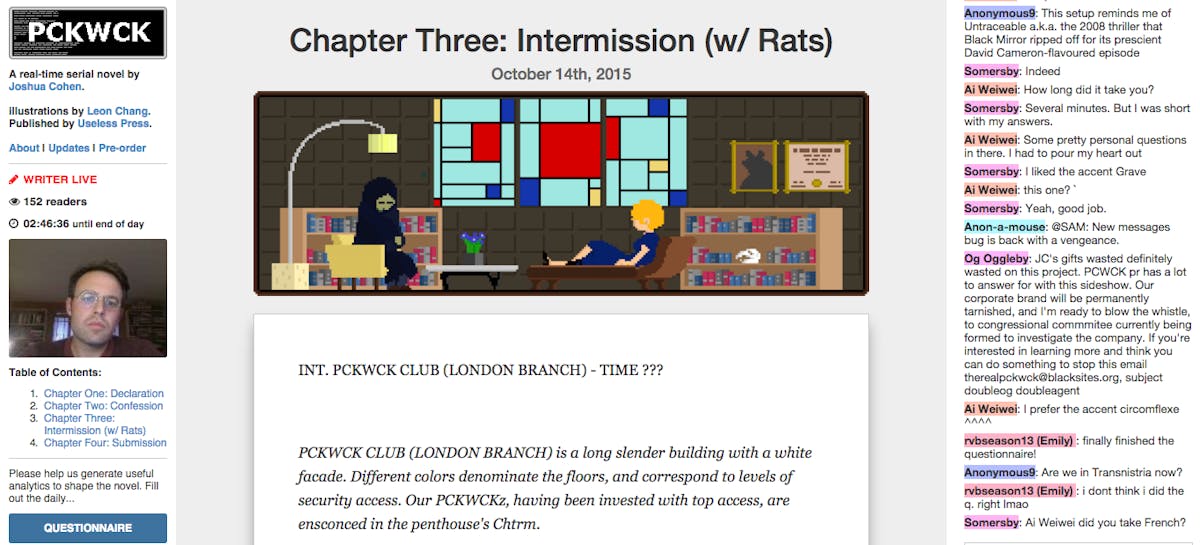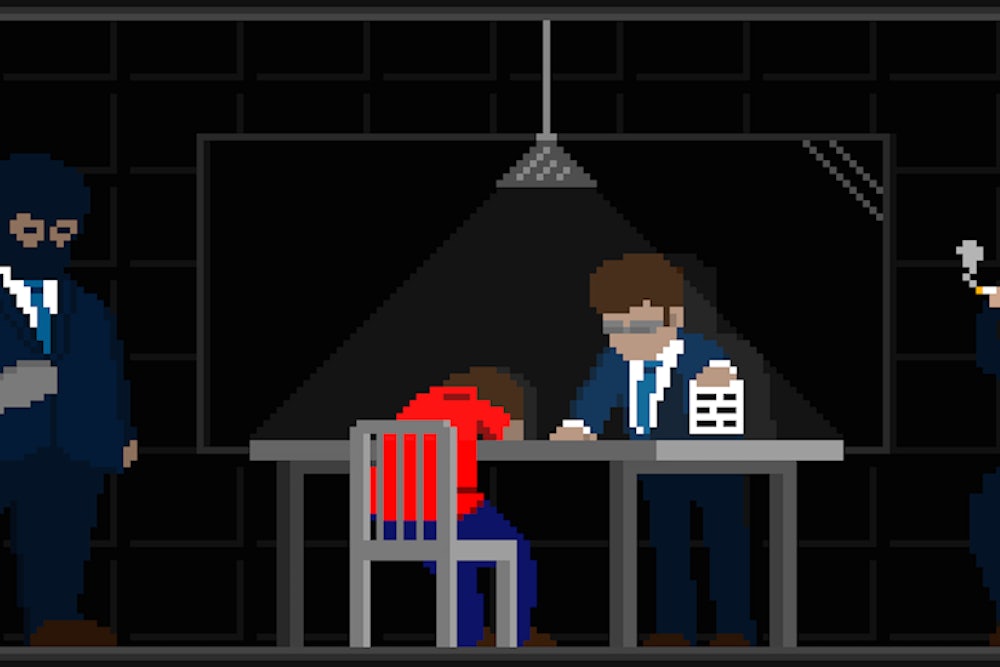Tune in to the internet today or tomorrow between 1 and 6pm Eastern Standard Time, and you can see a curious sight: an author, writing, live. You can watch this author, Joshua Cohen, furrow his brow in thought, or run a hand through his hair, or smoke a cigarette while he works. To be sure you could probably see the same thing in a coffee shop near you, but presumably those writers haven’t set out with the explicit agenda of enacting their art.
Cohen has, though. Between October 12th and 16th, the author of eight works of fiction (including, most recently, the novel The Book of Numbers), is engaged in a project called PCKWCK, a live adaptation of Charles Dickens’s first novel, The Pickwick Papers, with the illustrator Leon Chang. Viewers of PCKWCK can watch this work take shape in real time on a page à la Google Docs, blinking cursor and all; they can also, in smaller inset windows, watch a streaming feed of Cohen’s face while he works, or participate in running commentary with their fellow spectators.
“PROUD OF U JOSH,” wrote an observer under the handle ‘Thomas Pynchon,’ early on day three; to which ‘The Real Charles Dickens’ replied, “lmao FUCK joshua cohen,” before demurring, a few seconds later “jk, jk.” The ghost of Roland Barthes would have a field day—not only is The Author not dead, this one, at least, is starring in The Real World: Writing Edition.
Yet while the digital window-dressing is new, PCKWCK is only the latest log entry in a long history of writing-as-performance. In 2009 British pop philosopher Alain de Botton briefly took up residence at Heathrow airport, writing at a desk in the middle of a departure terminal. (That residency yielded a book about his experiences titled, aptly, A Week at the Airport.) The writer Harlan Ellison, working from a prompt from NBC News anchor Tom Brokaw, took five hours in 1981 to produce a short story while seated in a storefront window in Manhattan. And in 1930, a glass box was built into the offices of Paris-Soir so that author Georges Simenon could compose a novel while sealed inside. Sadly, it never happened—the newspaper went bankrupt on the eve of his planned performance—but that didn't stop Parisians from claiming it had in the years that followed.
What to make of these examples (even the apocryphal ones) of what we might call écriture vérité? Are they simply clever stunts, case studies in a society gone so far over to the spectacular that no act is free from the panoptical gaze? Or could these acts of literary legerdemain actually give us a deeper understanding of the creative act? More to the point: what happens when these writers have to go to the bathroom?
Certainly watching an author write is different from going to hear them read. Those events are pre-scripted, a recital of published words already safely confined to the printed page. In the raw act of composition, however, those same letters are allowed to run loose, spooling out into the ether in pursuit of the aleatory results of a great jazz improvisation.
Watching PCKWCK also feels unlike recent forays by several high-profile novelists—Teju Cole, Jennifer Egan, and David Mitchell, to name a few—who have explored writing pieces on and for Twitter. It’s not only the shorter length that makes these experiments seem less like high-wire acts, it’s that we don’t witness the writing itself; the work of drafting presumably took place beforehand, even if those authors decide to make changes at the last minute. After all, without the webcam footage we’ll never really know whether they genuinely wrote in medias res and IRL, so to speak.
This exhibitionist element was intentional on Cohen’s part. “While I did some abstract thinking [beforehand], I wanted to really keep it as honest and transparent as possible,” he said, speaking at the end of the project’s second day. “I wanted to make sure that it was deeply transparent. There’s a camera on me, I’m not copying and pasting anything. Each day I’m live-writing a new installment based entirely on the previous day’s user data and comments. I’m trying to meet the world on its own terms.”
Terms, it feels important to note, that would likely judge a female writer attempting something similar much more harshly. While Cohen has come in for a predictable share of abuse—including on at least one day some nasty anti-Semitic rhetoric—any Foucaultian critique of a woman’s ‘author-function’ might quickly take a turn into far worse territory, if internet history is any guide. In a sense watching Cohen the scrivener doesn’t feel all that different from peering in on a cam-girl, with its attendant power dynamics and voyeuristic thrills. PCKWCK’s viewers quickly picked up on this comparison, too, joking amongst themselves about whether he might strip down on their command (though in other, less family-friendly terms).

It’s striking that perhaps the most interesting developments in PCKWCK so far are taking place not in the doc Cohen is laboring over, but in the ersatz chatroom running alongside the manuscript. By virtue of its pace and responsiveness, this conversation invariably upstages what’s happening in Cohen’s working window, a challenge he somewhat anticipated in the project’s conception.
“I thought this would be about me struggling with what it meant to write toward a fixed product in a world that was not interested in that fixity,” he said. “We’re in a world in which anything that’s typed online has a greater chance at posterity than a poem printed only on a page.”
In other words, in the age of Snapchat, cultural literacy no longer foregrounds actual literacy (though one could argue whether it ever actually did, Norman Mailer and Gore Vidal duking it out in primetime notwithstanding). And as many critics have noted, being a so-called culture worker in the late-capitalist era is a dicey proposition. (Even the term, with its connotations of Taylorism, speaks volumes about our current economic realities.) In describing some of the thinking behind the project, Cohen spoke of “the idea of this insatiable maw that just is hungry for content, and you have to write more pieces for which you get paid less, and the utter exhaustion involved with that.” PCKWCK betrays this status anxiety over writers’ diminished relevance to society. Observing Cohen’s face as he stares down the blank page is like seeing this larger angst writ visible. It’s a disquieting experience. Or as one commenter stated, “this is so hard to watch.”
Ultimately this may be the real problem with writing in public—it doesn’t make for very good entertainment. It’s slow. There’s not much to see. So far Cohen’s viewers—and it seems most accurate to call them that, rather than readers—corroborate this assessment. Almost none of the website’s visitors are talking about Cohen’s process or the substance of his text, to say nothing of the original Dickens.
Some of this disinterest may be a result of the story’s opacity; namely, it’s hard to tell what PCKWCK is about. The narrative Cohen explained in our interview with him—the tale of a Muslim protagonist being interrogated by Blackwater-like military contractors—isn’t instantly intelligible. Also lost is the subtler metaphorical parallel he intended between the fictive torturers and PCKWCK’s peanut gallery who, like all good antagonists, have a hivemind of their own. At any given moment nearly all of them seem more interested in either the performance qua performance or their own back-and-forth riffs than anything Cohen is trying to create.
Almost exactly midway through PCKWCK’s run someone named ‘Sorry’ asked the assembled audience, “Is this guy writing a book or something?” to which an observer calling themselves ‘Somersby’ replied, “I think he supposed to be.” Countering both their claims, a person going only by ‘Anonymous’ offered what turned out to be the most telling corrective of all. “WE are writing a book.”
